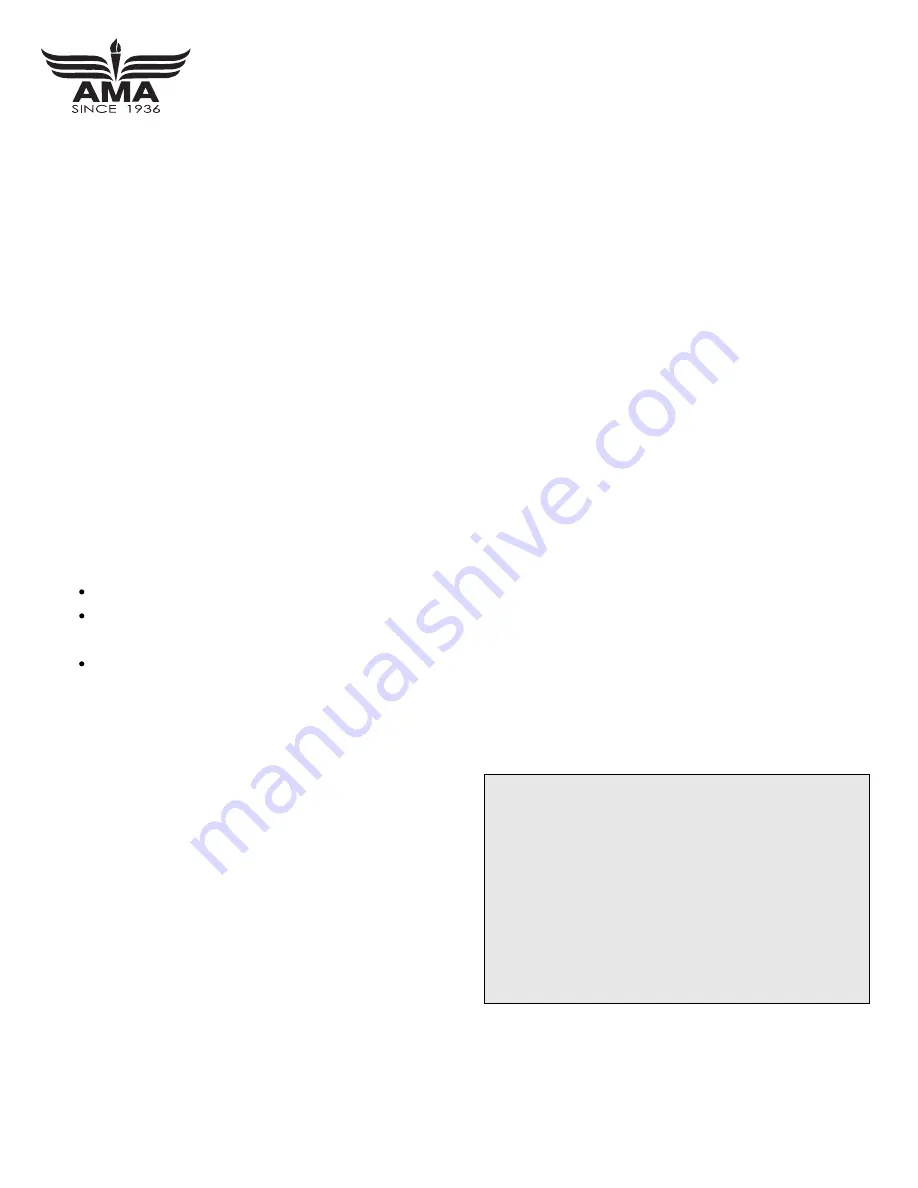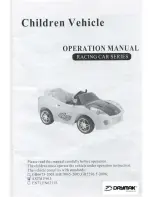
GENERAL:
A model aircraft is a non-human-carrying aircraft
capable of sustained fight in the atmosphere. It may not exceed
limitations of this code and is intended exclusively for sport,
recreation, education and/or competition. All model fights must be
conducted in accordance with this safety code and any additional
rules specific to the flying site.
Model aircraft will not be flown:
Model aircraft pilots will:
Model aircraft will not be flown in AMA sanctioned events, air shows
or model demonstrations unless:
When and where required by rule, helmets must be properly worn
and fastened. They must be OSHA, DOT, ANSI, SNELL or NOCSAE
approved or comply with comparable standards.
All pilots shall avoid flying directly over unprotected people, vessels,
vehicles or structures and shall avoid endangerment of life and
property of others.
A successful radio equipment ground-range check in accordance
with manufacturer's recommendations will be completed before the
first flight of a new or repaired model aircraft.
At all flying sites a safety line(s) must be established in front of
which all flying takes place. (AMA Document #706.)
(a)
(b)
(a)
(b)
(c)
(d)
(e)
(f)
(g)
(h)
(i)
(j)
(a)
(b)
(a)
(b)
(c)
(d)
1.
2.
3.
4.
1.
2.
Exceptions:
Free Flight fuses or devices that burn producing smoke and are
securely attached to the model aircraft during flight.
Rocket motors (using solid propellant) up to a G-series size may
be used provided they remain attached to the model during flight.
Model rockets may be flown in accordance with the National
Model Rocketry Safety Code but may not be launched from
model aircraft.
Officially designated AMA Air Show Teams (AST) are authorized
to use devices and practices as defined within the Team AMA
Program Document. (AMA Document #718.)
A.
B.
Academy of Model Aeronautics National Model Aircraft Safety Code
Effective January 1, 2018
In a careless or reckless manner.
At a location where model aircraft activities are prohibited.
Yield the right of way to all human-carrying aircraft.
See and avoid all aircraft and a spotter must be used when
appropriate. (AMA Document #540-D.)
Not fly higher than approximately 400 feet above ground level
within three (3) miles of an airport without notifying the airport
operator.
Not interfere with operations and traffic patterns at any airport,
heliport or seaplane base except where there is a mixed use
agreement.
Not exceed a takeoff weight, including fuel, of 55 pounds unless
in compliance with the AMA Large Model Airplane program. (AMA
Document 520-A.)
Ensure the aircraft is identified with the name and address or
AMA number of the owner on the inside of affixed to the outside
of the model aircraft. (This does not apply to model aircraft flown
indoors.)
Not operate aircraft with metal-blade propellers or with gaseous
boosts except for helicopters operated under the provisions of
AMA Document #555.
Not operate model aircraft while under the influence of alcohol or
while using any drug that could adversely affect the pilot's ability
to safely control the model.
Not operate model aircraft carrying pyrotechnic devices that
explode or burn, or any device which propels a projectile or drops
any object that creates hazard to persons or property.
Not operate a turbine-powered aircraft, unless in compliance with
the AMA turbine regulations. (AMA Document #510-A.)
The aircraft, control system and pilot skills have successfully
demonstrated all maneuvers intended or anticipated prior to the
specific event.
An inexperienced pilot is assisted by an experienced pilot.
Only personnel associated with flying the model aircraft are
allowed at or in front of the safety line.
At air shows or demonstrations, a straight safety line must be
established.
An area away from the safety line must be maintained for
spectators.
Intentional flying behind the safety line is prohibited.
RADIO CONTROL (RC)
If you are not an AMA member, please consider joining.
Founded in 1936 and open to anyone interested in model
aviation, the AMA is the governing body for model aviation in
the United States and sanctions over 2,000 competitions
anually. Membership in the AMA provides liability insurance
coverage, protects modelers' rights and interests, and is
required to fly at most of the 2,700+ R/C sites nationwide.
Academy of Model Aeronautics
5161 East Memorial Drive
Muncie, IN 47302-9252
Toll Free (800) 435-9262
Fax (765) 741-0057
www.modelaircraft.org
4.
5.
6.
7.
8.
9.
C. FREE FLIGHT
1.
2.
3.
D. CONTROL LINE
1.
2.
3.
4.
5.
RC model aircraft must use the radio-control frequencies currently
allowed by the Federal Communications Commission (FCC). Only
individuals properly licensed by the FCC are authorized to operate
equipment on Amateur Band frequencies.
RC model aircraft will not knowingly operate within three (3) miles
of any pre-existing flying site without a frequency-management
agreement. (AMA Documents #922 and #923)
With the exception of events flown under official AMA Competition
Regulations, excluding takeoff and landing, no powered model may
be flown outdoors closer than 25 feet to any individual, except for
the pilot and the pilot's helper(s) located at the flightline.
Under no circumstances may a pilot or other person touch an
outdoor model aircraft in flight while it is still under power, except to
divert it from striking an individual.
RC night flying requires a lighting system providing the pilot with a
clear view of the model's attitude and orientation at all times. Hand-
held illumination systems are inadequate for night flying operations.
The pilot of an RC model aircraft shall:
Must be at least 100 feet downwind of spectators and automobile
parking when the model aircraft is launched.
Launch area must be clear of all individuals except mechanics,
officials, and other fliers.
An effective device will be used to extinguish any fuse on the model
aircraft after the fuse has completed its function.
The complete control system (including the safety thong where
applicable) must have an inspection and pull test prior to flying.
The pull test will be in accordance with the current Competition
Regulations for the applicable model aircraft category.
Model aircraft not fitting a specific category shall use those pull-test
requirements as indicated for Control Line Precision Aerobatics.
The flying area must be clear of all utility wires or poles and a
model aircraft will not be flown closer than 50 feet to any above-
ground electric utility lines.
The flying area must be clear of all nonessential participants and
spectators before the engine is started.
(a)
(b)
(c)
Maintain control during the entire flight, maintaining visual
contact without enhancement other than by corrective lenses
prescribed for the pilot.
Fly using the assistance of a camera or First-Person-View
(FPV) only in accordance with the procedures outlined in AMA
Document #550.
Fly using the assistance of autopilot or stabilization system only
in accordance with the procedures outlined in AMA Document
#560
26
Summary of Contents for QQ EXTRA 300G2
Page 1: ...Day Night Versions Day Night Versions G2 G2 ...
Page 2: ......

































